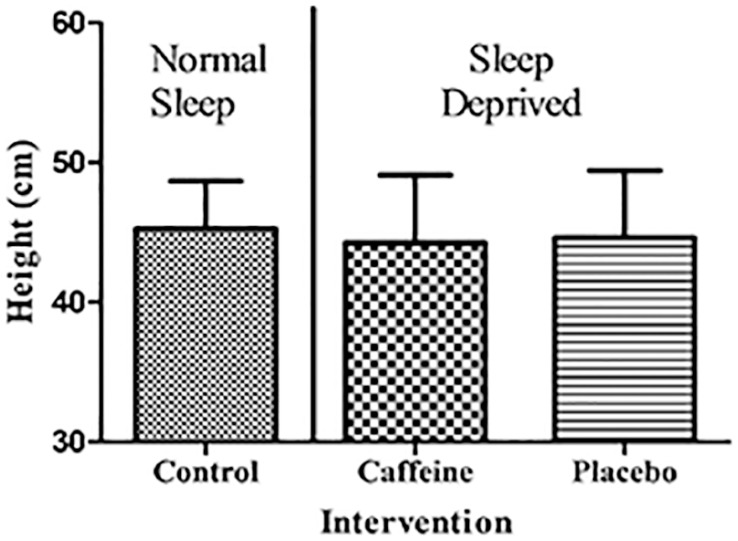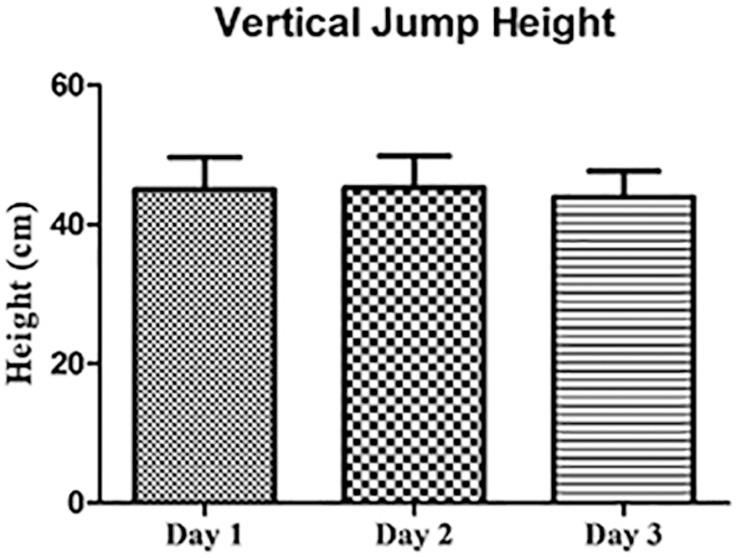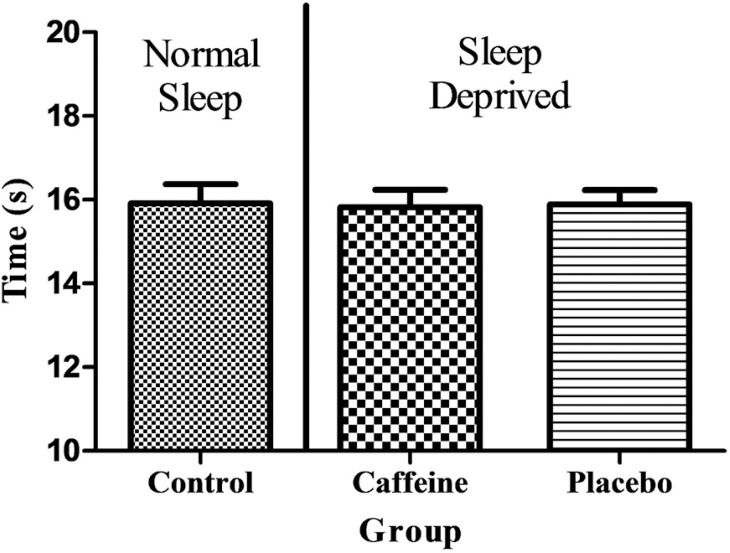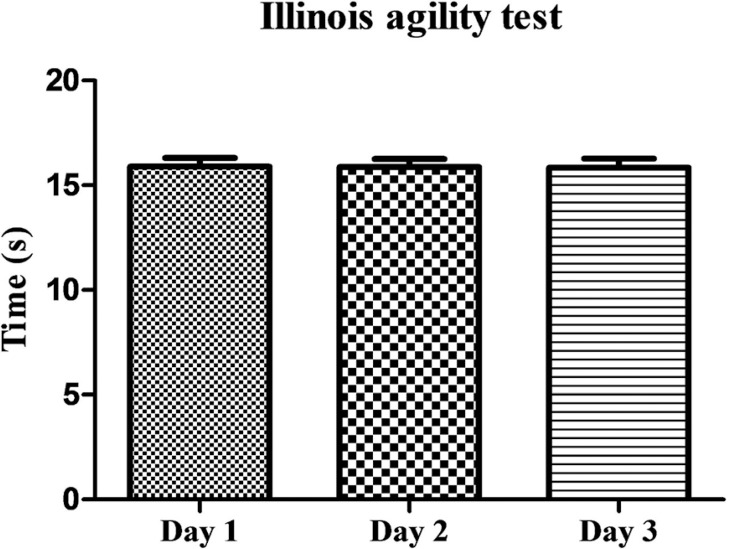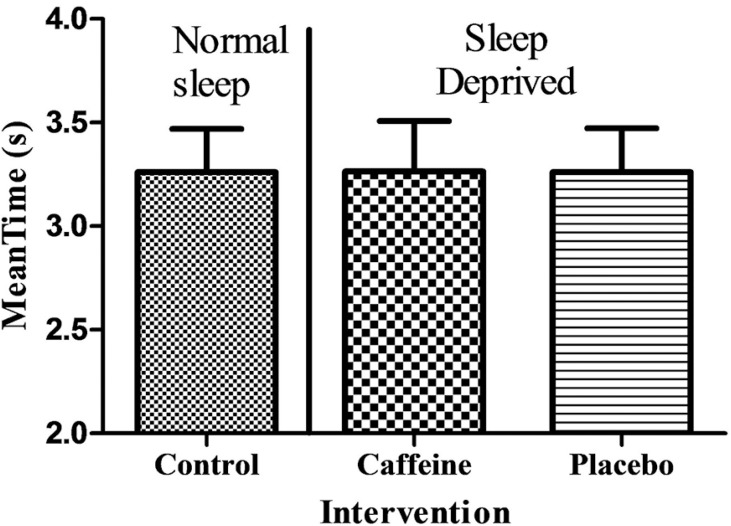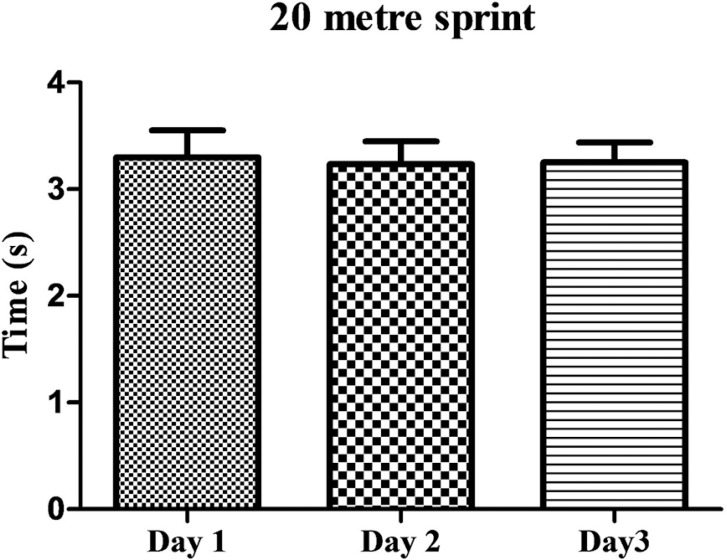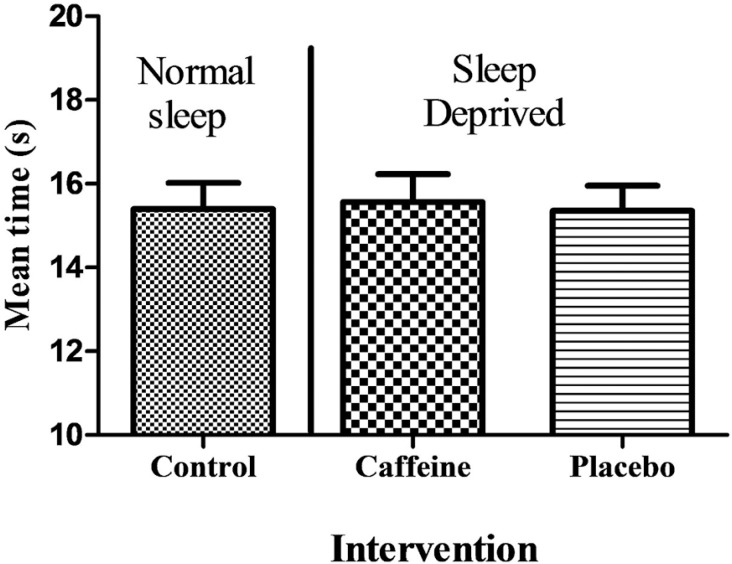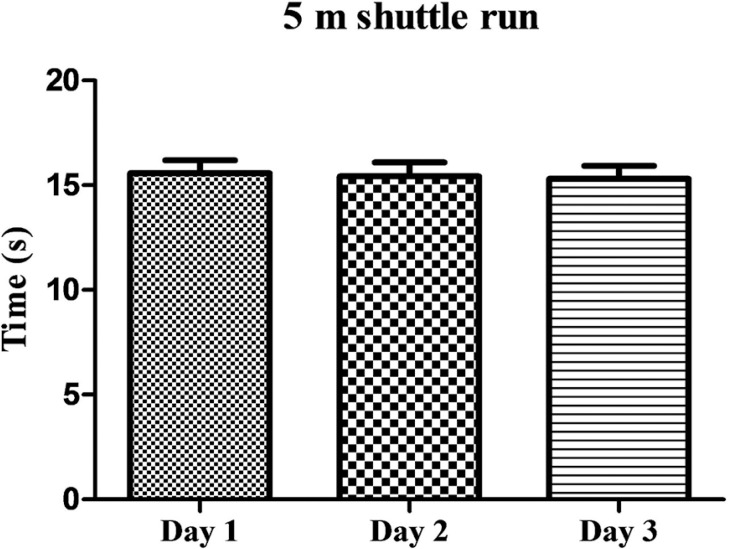Abstract
Purpose
Athletes involved in team sports may be subject to varying degrees of sleep deprivation either before or after training and competition. Despite the belief among athletes and coaches of the importance of adequate sleep for ensuing performance, the effect of sleep loss on team-sport anaerobic performance remains unclear. There is conflicting evidence in the scientific literature as to the impact of acute sleep deprivation and caffeine supplementation on anaerobic performance indices. The purpose of this study is to investigate the effect of 24 hours of acute sleep deprivation on anaerobic performance and the effect of caffeine supplementation on anaerobic performance in the sleep deprived state.
Methods
11 club level games players (n=11, 25±4 yr, 178±7.5 cm, 80.2±10.4 kg, 15.1±5.6% body fat) participated in a repeated measures double-blinded placebo control trial. Following familiarisation, each participant returned for testing on three separate occasions. One of the testing sessions took place following a night of normal sleep and the other two sessions took place following 24 hours of sleep deprivation with supplementation of either placebo or 6 mg.kg- 1 of caffeine. During each testing session participants performed the vertical jump height, 20-m straight sprint, Illinois speed agility test and 5-m shuttle run.
Results
No significant differences were detected comparing non sleep deprived and sleep deprived interventions in any of the assessed outcome measures. There were also no significant differences observed in any of the outcome measures when comparing caffeine and placebo data in the sleep deprived state.
Conclusion
In this cohort of athletes, a 24-h period of acute sleep deprivation did not have any significant impact on anaerobic performance. Caffeine also did not have any effect of on anaerobic performance in the sleep-deprived state.
Keywords: Sleep Deprivation, Caffeine, Anaerobic Treatment, Placebo Effect
INTRODUCTION
A growing collection of evidence indicates that sleep plays a major role in the recovery and performance of athletes, yet many of the complex processes of sleep remain a mystery. Understanding the impact of sleep, disturbed sleep and sleep deprivation, promote a better appreciation of its effect on athletes. Sleep deprivation for the purpose of this study is being described as 24 consecutive hours without sleep. Sleep deprivation can be complete with no sleep, or partial with restricted hours of sleep.
Caffeine has well documented effects on reaction time, cognition and mood following sleep deprivation1-5. Conflicting evidence exists in the scientific literature as to the impact of acute sleep deprivation (ranging from 24 to 60-h) on anaerobic performance indices2,6-8. The studies that have documented significant deterioration in anaerobic performance indices followed at least 30-h of sleep deprivation. Currently, the limited evidence available suggests that caffeine can potentially counteract the negative effect of acute sleep deprivation on anaerobic performance capacity, although more studies are needed to validate these outcomes.
The primary aim of this study was to examine the effect of 24 hours of sleep deprivation and caffeine supplementation on anaerobic capacity.
METHODS
Participants
Inclusion criteria were, healthy male amateur games players as assessed by subjective questionnaire and medical examination, actively participating in a competitive sport on a seasonal basis and aged 18-35 yr. Athletes were excluded from the study if they did not participate in competitive games, were female, or if they were deemed unfit to participate medically. In total, 11 athletes were enrolled into the current study.
Data in Table 1 presents participants’ age, height, mass, percent body fat and body mass index data. Body fat composition was assessed via skinfold caliper. Percentage body fat data were consistent with the assumed normal range for games players. The Trinity College Dublin Research Ethics Committee granted ethical approval for the study prior to commencement.
Table 1.
Mean±SD anthropometric data of participants (n=11)
| Expected
range (Mean ± SD) |
Results (Mean ± SD) |
|
|---|---|---|
| Height (cm) | 176±6 | 178±8 |
| Age (yr) | 24±6 | 25±4 |
| Mass (kg) | 80.0±8.2 | 80.2±10.4 |
| BMI (kg.m-2) | 23.4±1.8 | 24.1±2.3 |
| Body fat (%) | 15.0±4.2 | 15.1±5.6 |
BMI=Body mass index; SD=standard deviation.
Protocol
Each participant required 4 test sessions; namely, non-sleep deprived familiarisation session, a non-sleep deprived night (NSD) with no supplementation, a sleep-deprived night (SDC) with caffeine supplementation (6 mg.kg-1) and a sleep deprived night (SDP) with placebo supplementation. Each test day was separated by at least one week to facilitate adequate recovery between sessions. All testing was performed indoors in a gymnasium to minimise environmental factors influencing test data.
A maximum of 4 participants attended on any test day, and to ensure a competitive environment competed in pairs based on performance data collected during their familiarisation session. For the purpose of this study, acute sleep deprivation was defined as remaining awake, with no sleep, for a period of 24-h prior to commencing testing. Participants arrived in Dublin on the night prior to testing and remained at an independent accommodation for the night prior. A member of the test team accompanied all participants once they arrived. Strict supervision of participants occurred in order to ensure concordance of sleep deprivation.
A standardised timetable of events to entertain athletes occurred each night; including video gaming and board games. Lights were kept on during the sleep deprivation period and volunteers were allowed to walk short distances but were not allowed to exercise. Volunteers were offered a pasta and chicken meal at 02:00 during nights of sleep deprivation and were also free to drink water. Following the non-sleep deprived night (NSD) participants rated the quality of their night sleep from 1 to 4 (1 being very bad; 2 fairly bad; 3 fairly good; 4 very good). They were also asked to estimate the quantity of sleep to the nearest hour. On each test day, a uniform breakfast of 5 kCal.kg-1 body mass, consisting of cornflakes and low-fat milk was served to participants at 07:00. Breakfast content and timing was uniform for all scheduled tests.
The caffeine (anhydrous caffeine, Sigma Aldrich, MO, USA) or placebo (lactose BDH, Poole, UK) supplements were pre-measured by the project supervisor, and amounted to 6 mg per kg body mass for each individual. Neither tester nor athlete (double blinded study design) knew the content of the randomly assigned capsule. Each individual’s mass, denoted by his initials to maintain anonymity, assessed during familiarisation, was provided to the project supervisor for capsule preparation.
The placebo (lactose) or caffeine supplement was then accurately weighed using a laboratory grade scales and placed into either brown or white capsules at random. Consequently, the project supervisor, an individual not involved in data collection, was the only member of the team with knowledge of the contents of each athlete’s assigned capsules. The caffeine or placebo capsules were administered to volunteers at 08:00 (2.5 hours prior to testing).
The outcome measures investigated were the modified speed agility test, VJ height, a timed 20-m sprint and a 5-m shuttle run. Testing commenced at 10:30. Participants performed each test three times. Vertical jump was measured using a vertical jump meter (Jump-MD, Takai, Japan). Each participant attempted the jump three times with 30-s rest intervals. The best score for each participant was recorded. Electronic speed timing gates (Brower Timing Systems, Utah, USA) were used to assess 20-m sprint times. A starting pad was placed under the participant front most foot. The timing device started when the participant lifted their foot off the pressure ad and stopped when they passed an infrared beam at the finish line. Each participant completed the 20-m sprint 3 times with 90-s rest intervals, and the best time was recorded.
The Illinois speed agility test can discriminate between elite and low level field sport players better than any other field test and is considered one of the best tests to measure an athlete’s agility9. Electronic speed timing gates (light cells) were used to calculate run times. The timing device started when the participant passed through an infrared beam at the starting line and stopped when participants passed through the beam at the finish line. The total distance of the course was roughly 68m. Each participant completed the course 3 times with rest intervals of 2 min between each attempt. Each participant’s best time was recorded.
Statistical analysis
Normality of data was assessed using the Pearson D’Agistino omnibus normality test. Group data are presented as mean and standard deviation. Data across intervention and across test sessions were analysed using a single factor repeated measures ANOVA. A value of p<0.05 inferred statistical significance.
RESULTS
A total of 14 participants were approached and agreed to take part in the study. One volunteer was unable to partake in the study as he did not pass the medical examination. One volunteer withdrew due to work commitments and time constraints. One volunteer withdrew due to injury not associated with testing during the study timeframe. A total of eleven (n=11) participants completed all three testing days and familiarisation sessions within the accepted timeframe. The mean daily caffeine intake of the participants was 1.5±2 cups of coffee. The average quality of sleep was rated as 3±1 (fairly good). The average estimated length of sleep was 7.3±.67 hours.
Vertical jump height test results
Vertical jump height was measured using a vertical jump meter (Jump-MD, Takai, Japan). Both the average score for 3 attempts and the best score were recorded. Vertical jump height was compared between experimental interventions and day sequence. The experimental interventions were non-sleep deprived (NSD), sleep deprived with caffeine supplementation (SDC) and sleep deprived with placebo supplementation (SDP).
The average scores were also compared across test day sequence examine if there was any improvement due to increased familiarisation with the tests. The mean height recorded was 45.3±3.4 cm for NSD, 44.3±4.8 cm for SDC and 44.6±4.8 cm for SDP. There were no statistically significant differences (p>0.05) observed across intervention or test day sequence (Figure 1 and 2).
Figure 1.
Vertical jump (cm) data comparing results across testing intervention. Error bars denote SD, n=11.
Figure 2.
Vertical jump height (cm) data comparing results across testing day sequence.
Illinois speed agility test results
Illinois speed agility test data were analysed comparing NSD, SDC and SDP. Both the best score and the average score were also compared between testing day 1 (D1), testing day 2 (D2) and testing day 3 (D3). The mean time recorded was 16.11±.44 (s) for NSD, 16.14±.47 (s) for SDC, and 16.03±.40 for SDP There were no significant differences (p>0.05) observed across intervention or test day sequence (Figure 3 and 4).
Figure 3.
Mean Illinois speed agility test (s) data comparing results across testing intervention.
Figure 4.
Mean Illinois speed agility test (s) data comparing results across testing day sequence.
20-metre straight sprint test results
20-m straight sprint data were analysed comparing Control, SDC and SDP. Both the best score and the average score were also compared between testing day 1 (D1), testing day 2 (D2) and testing day 3 (D3). The mean time recorded was 3.26±.21(s) for NSD, 3.27±.24 (s) for SDC, and 3.26±.21(s) for SDP. There were no significant differences (p>0.05) observed across intervention or test day sequence (Figure 5 and 6).
Figure 5.
20-metre straight sprint (s) data comparing results across testing intervention.
Figure 6.
20-metre straight sprint (s) data comparing results across testing day sequence.
5-metre shuttle run test results
5-metre shuttle run test data were analysed comparing Control, SDC and SDP. Both the best score and the average score were also compared between testing day 1 (D1), testing day 2 (D2) and testing day 3 (D3). The mean time recorded was 15.40±.62 (s) for NSD, 15.56±.67 (s) for SDC, and 15.35±.61 (s) for SDP. There were no significant differences (p>0.05) observed across intervention or test day sequence (Figure 7 and 8).
Figure 7.
5-metre straight sprint (s) data comparing results across testing intervention.
Figure 8.
5-metre straight sprint (s) data comparing results across testing day sequence.
DISCUSSION
The main findings of the current study were that acute sleep deprivation and caffeine supplementation had no effect on outcome measures assessed. This suggests that 24 hours of sleep deprivation does not impair anaerobic performance. These findings are consistent with those reported by Blumert et al.10 and Souissi et al.6.
Blumert et al.10 investigated the effects of 24-h of sleep loss on weightlifting performance with the testing protocol consisting of several sets of snatches, clean and jerks, and front squats. Souissi et al.6 assessed anaerobic performance in 13 healthy male participants at 06:00 and 18:00 following a normal night’s sleep, and again following a night of no sleep. Maximal power, peak power and mean power were all measured during Wingate testing. Their results showed that anaerobic power variables were not affected after 24-h of wakefulness; however, they were impaired after 36-h of wakefulness. These results are in agreement with those of the current study in that 24 hours of acute sleep deprivation did not affect anaerobic performance. The impaired performance following 36 hours may be due to the longer duration of sleep deprivation.
In the study of Souissi et al.6 the actual scores for mean power, maximal power and peak power were actually greater at 18:00 (following 36 hours of sleep deprivation) than at 08:00 (following 24 hours of sleep deprivation). The impaired performance at 36 hours when compared to normal night sleep is most likely due the cumulative effect of sleep deprivativon combined with the circadian rhythm. Had the current study included a second testing session at 36 hours we may have found similar results.
Another difference between the study of Souissi et al.6 and this present study is that the exercise protocol employed. Although the Wingate test is typically used to examine anaerobic capacity, it does not reflect the performance requirements of sports involving intermittent high-intensity efforts (e.g. soccer, rugby, gaelic games, field hockey, American football), and consequently it is uncertain whether the results of caffeine on Wingate performance would be observed during sports-specific activities. Court or field-base team sports often consist of short bouts of intermittent sprints (2-5 seconds), performed over short distances (10-20 m), and with brief rest periods between bouts.
No significant differences were observed in any of the outcome measures when comparing caffeine to placebo. This is in agreement with the studies of Paton et al.7, Souissi et al.2, Beck et al.11 and Hoffman et al.5. In the study of Paton et al. 7, 16 male team-sport athletes ingested either placebo or 6 mg.kg-1 of caffeine, 60 min before performing a repeated-sprint test. The test consisted of 10 20 metre sprints (mean time of 3.6 s), each performed within 10 s, followed by a rest for the remainder of the 10-s period. As in this present study, participants were competitive, male team-sport athletes, who had controlled diets for 24 h preceding each trial and were asked to avoid caffeine-containing foods and beverages for at least 24 h before each testing session. Trials were also conducted in a placebo controlled, randomized, double-blind fashion. Similar to our findings they reported no improvement in anaerobic performance associated with caffeine supplementation.
The findings of this present study compare to those of Souissi et al.2 in that anaerobic performance was unaffected by caffeine ingestion when compared to placebo. During each of their testing sessions, participants performed the squat jump, the reaction time, and the Wingate test. However, the present study’s results are at odds with those of Kang et al.8 that showed a significant increase in peak power and mean power during a Wingate test after the ingestion of 5 mg.kg-1 of caffeine. The reason for these discrepancies may be due to the utilisation of different exercise modes, frequencies, intensities and durations, as well as different evaluation procedures.
The results of this current study are also at odds with those of Schneiker et al.12 who examined the effects of acute caffeine ingestion on prolonged intermittent-sprint performance. In their study participants performed two 36-minute halves, with each half composed of 18 · 4-second maximal exertion cycling bouts with 2 minutes recovery between sprints. In contrast to findings of this present study Schneiker et al.12 reported that compared with placebo, caffeine use resulted in a significant improvement for the first half (8.5% improvement) and second half (7.6% improvement) for total work. Similarly, there was a significant improvement for the first half (7.0% improvement) and second half (6.6% improvement) for peak power.
The difference in results between the present study and that by Schneiker et al.12 may be attributable to differences in the exercise protocols used. Whereas a running protocol, as used in this present study and in that of Paton et al.7 more closely replicates the usual form of activity performed by team-sport athletes, the cycle ergometer that was used in the study of Schneiker et al.12 may allow for a high degree of accuracy in the measurement of work and power output. It is possible that participants in this present study may have achieved greater peak power while sprinting following caffeine ingestion, but this was not reflected in any of the outcome measures assessed.
Another reason for the lack of improvement seen following caffeine supplementation may have been due to the dose of caffeine used. The mechanisms by which caffeine would have an effect on the energy system contribution during short- term performance remain unclear. Several mechanisms of caffeine demonstrated in vitro studies that used higher levels of this substance include a caffeine-induced Ca2 + release from the sarcoplasmic reticulum, a direct effect on myofibrils, an inhibition of phosphodiesterase, and alterations in neuromuscular transmission13. Therefore, a higher dose of caffeine may be needed to elicit an ergogenic effect on physical performance.
The lack of improvement following caffeine ingestion may also be due to the nature of the testing of the variable. Reaction times were not tested as participants were allowed to begin to sprint when they wished within a 10-s window. Previous reports such as Souissi et al.2 and Kang et al.8 have showed significant reductions in simple reaction time 60 min after caffeine ingestion. To explain this effect, previous studies have suggested that the stimulating effect of caffeine on the CNS through antagonism of adenosine may cause an increase in adrenaline and dopamine that could improve the subjects’ attention8.
A final reason for the lack of any improvements in anaerobic performance with caffeine seen in this study may also be due to the level of trainability of participants. While training levels were not ascertained from participants within this study, all athletes were recruited from amateur clubs and no volunteer was competing at an elite level within their sport. Davis & Green4 reported that the ergogenic effect of caffeine on anaerobic exercises occurs especially in trained subjects. Previous reports revealed an ergogenic effect of caffeine ingestion in trained subjects using the same doses as in the present study12. An ergogenic effect of caffeine may have been observed had higher level athletes participated in the study.
Study Limitations
A few limitations must be taken into account when considering the results of this study. The majority of the studies that have shown a negative affect of acute sleep deprivation have involved periods of sleep loss of greater than 30 hours. The 24 hours of sleep deprivation employed in this study may not have been long enough to cause a physiological effect. The detrimental effects of 36 vs. 24 hours of sleep deprivation observed in other studies may however just be related to circadian effects (i.e. exercising in the dipping part of the sleep-wake cycle), which would become much more pronounced under conditions of sleep deprivation. It would have been interesting to have a repeat testing sessions at different times in the day to examine if this was the case. This would allow for further examination of the role of circadian rhythm in anaerobic performance. Testing sessions in the afternoon and evening is also the times during which most team based competitions occur.
A further limitation is the training levels of study participants. As previously stated, the ergogenic effect of caffeine is thought to be greatest in highly trained athletes4. As stated previously the activity levels of the participant were not investigated, however, none were elite level athletes within their chosen sport. This may have impacted both the effect of acute sleep deprivation and caffeine on anaerobic performance.
Finally the quality and duration of sleep following the non-sleep deprived nights was only measured subjectively. It would have been beneficial if the sleep had been monitored objectively.
CONCLUSION
In this cohort of athletes, 24 hours of acute sleep deprivation did not have any significant difference on anaerobic capacity. Caffeine also did not have any effect of on anaerobic capacity. A longer period of sleep deprivation may be needed to produce a significant deterioration in anaerobic performance.
REFERENCES
- 1.Wesensten N, Killgore W, Balkin T. Performance and alertness effects of caffeine, dextroamphetamine, and modafinil during sleep deprivation. J Sleep Res. 2005;14(3):255–266. doi: 10.1111/j.1365-2869.2005.00468.x. http://dx.doi.org/10.1111/j.1365-2869.2005.00468.x [DOI] [PubMed] [Google Scholar]
- 2.Souissi M, Chtourou H, Abedelmalek S, Ghozlane IB, Sahnoun Z. The effects of caffeine ingestion on the reaction time and short-term maximal performance after 36 h of sleep deprivation. Physiol Behav. 2014;131:1–6. doi: 10.1016/j.physbeh.2014.04.012. http://dx.doi.org/10.1016/j.physbeh.2014.04.012 [DOI] [PubMed] [Google Scholar]
- 3.Cook C, Beaven CM, Kilduff LP, Drawer S. Acute caffeine ingestion’s increase of voluntarily chosen resistance-training load after limited sleep. Int J Sport Nutr Exerc Metab. 2012;22(3):157–164. doi: 10.1123/ijsnem.22.3.157. http://dx.doi.org/10.1123/ijsnem.22.3.157 [DOI] [PubMed] [Google Scholar]
- 4.Davis JK, Green JM. Caffeine and anaerobic performance: ergogenic value and mechanisms of action. Sports Med. 2009;39(10):813–832. doi: 10.2165/11317770-000000000-00000. http://dx.doi.org/10.2165/11317770-000000000-00000 [DOI] [PubMed] [Google Scholar]
- 5.Hoffman JR, Kang J, Ratamess NA, Jennings PF, Mangine GT, Faigenbaum AD. Effect of nutritionally enriched coffee consumption on aerobic and anaerobic exercise performance. J Strength Cond Res. 2007;21(2):456–459. doi: 10.1519/R-20326.1. http://dx.doi.org/10.1519/R-20326.1 [DOI] [PubMed] [Google Scholar]
- 6.Souissi N, Sesboüé B, Gauthier A, Larue J, Davenne D. Effects of one night’s sleep deprivation on anaerobic performance the following day. Eur J Appl Physiol. 2003;89(3-4):359–366. doi: 10.1007/s00421-003-0793-7. http://dx.doi.org/10.1007/s00421-003-0793-7 [DOI] [PubMed] [Google Scholar]
- 7.Paton CD, Hopkins WG, Vollebregt L. Little effect of caffeine ingestion on repeated sprints in team-sport athletes. Med Sci Sports Exerc. 2001;33(5):822–825. doi: 10.1097/00005768-200105000-00023. http://dx.doi.org/10.1097/00005768-200105000-00023 [DOI] [PubMed] [Google Scholar]
- 8.Kang H, Kim H, Kim B. Acute effects of caffeine intake on maximal anaerobic power during the 30s Wingate cycling test. J Exerc Physiol. 1998;10:S804. [Google Scholar]
- 9.Amiri-Khorasani M, Sahebozamani M, Tabrizi KG, Yusof AB. Acute effect of different stretching methods on Illinois agility test in soccer players. J Strength Cond Res. 2010;24(10):2698–2704. doi: 10.1519/JSC.0b013e3181bf049c. http://dx.doi.org/10.1519/JSC.0b013e3181bf049c [DOI] [PubMed] [Google Scholar]
- 10.Blumert PA, Crum AJ, Ernsting M, Volek JS, Hollander DB, Haff EE, et al. The acute effects of twenty-four hours of sleep loss on the performance of national-caliber male collegiate weightlifters. J Strength Cond Res. 2007;21(4):1146–1154. doi: 10.1519/R-21606.1. http://dx.doi.org/10.1519/R-21606.1 [DOI] [PubMed] [Google Scholar]
- 11.Beck TW, Housh TJ, Schmidt RJ, Johnson GO, Housh DJ, Coburn JW, et al. The acute effects of a caffeine-containing supplement on strength, muscular endurance, and anaerobic capabilities. J Strength Cond Res. 2006;20(3):506–510. doi: 10.1519/18285.1. [DOI] [PubMed] [Google Scholar]
- 12.Schneiker KT, Bishop D, Dawson B, Hackett LP. Effects of caffeine on prolonged intermittent-sprint ability in team-sport athletes. Med Sci Sports Exerc. 2006;38(3):578–585. doi: 10.1249/01.mss.0000188449.18968.62. http://dx.doi.org/10.1249/01.mss.0000188449.18968.62 [DOI] [PubMed] [Google Scholar]
- 13.Tarnopolsky MA. Caffeine and endurance performance. Sports Med. 1994;18(2):109–125. doi: 10.2165/00007256-199418020-00004. http://dx.doi.org/10.2165/00007256-199418020-00004 [DOI] [PubMed] [Google Scholar]



